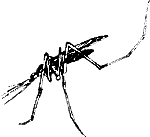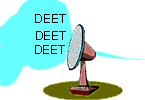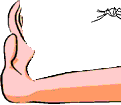 December 24, 2002
December 24, 2002
Mosquitoes can spread diseases such as malaria, encephalitis, yellow
fever, and West Nile virus. Scientists are always
looking for ways to protect people from these diseases.
 A chemical mosquito
repellent, such as DEET, is one established way
to avoid mosquito bites. In fighting mosquito bites, it is helpful to
know what these insects like and dislike. For example, some mosquitoes
favor temperatures between 37 and 40oC and humidities between
70 and 80%. Mosquitoes are also attracted to carbon dioxide and lactic
acid that humans release when we breathe and sweat. A chemical mosquito
repellent, such as DEET, is one established way
to avoid mosquito bites. In fighting mosquito bites, it is helpful to
know what these insects like and dislike. For example, some mosquitoes
favor temperatures between 37 and 40oC and humidities between
70 and 80%. Mosquitoes are also attracted to carbon dioxide and lactic
acid that humans release when we breathe and sweat.
 To study new ways to
control mosquitoes, researchers at the Department of Entomology at
Michigan State University experimented with two things that mosquitoes
don't like: DEET and wind. In fact, mosquitoes seem to avoid places with
wind speeds that approach their own flying speeds (0.4 to 1.6 meters/sec;
0.9 to 3.6 miles/hour). To study new ways to
control mosquitoes, researchers at the Department of Entomology at
Michigan State University experimented with two things that mosquitoes
don't like: DEET and wind. In fact, mosquitoes seem to avoid places with
wind speeds that approach their own flying speeds (0.4 to 1.6 meters/sec;
0.9 to 3.6 miles/hour).
The researchers set up their experiment in the woods of Michigan. They
applied 90% DEET to an air filter that was connected to a large fan. A
test subject was placed 1.6 meters downwind from the fan.  The wind speed at this distance away from the fan was 0.6 meter/sec.
One researcher, covered in protective clothing, stood by the test subject
and counted the number of times mosquitoes oriented to, landed on and
probed the test subject.
As soon as a mosquito probed the test subject by attempting to
feed, the researcher collected the mosquito in a vial for later
identification.
The wind speed at this distance away from the fan was 0.6 meter/sec.
One researcher, covered in protective clothing, stood by the test subject
and counted the number of times mosquitoes oriented to, landed on and
probed the test subject.
As soon as a mosquito probed the test subject by attempting to
feed, the researcher collected the mosquito in a vial for later
identification.
When the fan was turned on and blew DEET into the air, the number of
orienting, landing and probing mosquitoes was less than when the fan was
turned off. If no DEET was added to the filter, the fan still reduced the
number of mosquitoes compared to conditions when the fan was left off.
However, the best results were obtained in windy conditions with DEET.
 Why does wind work to repel mosquitoes? Wind may interfere with the
mosquito's ability to fly and thus be unable to move to a food source.
If a mosquito can't fly, it can't find you. Wind may also disperse carbon
dioxide and lactic acid given off by a person. If a mosquito can't smell
you, it can't find you. The combination of DEET and wind provides an
extra punch to the mosquito olfactory sense -- giving humans another
weapon in the fight against pesky mosquito bites.
Why does wind work to repel mosquitoes? Wind may interfere with the
mosquito's ability to fly and thus be unable to move to a food source.
If a mosquito can't fly, it can't find you. Wind may also disperse carbon
dioxide and lactic acid given off by a person. If a mosquito can't smell
you, it can't find you. The combination of DEET and wind provides an
extra punch to the mosquito olfactory sense -- giving humans another
weapon in the fight against pesky mosquito bites. |  December 24, 2002
December 24, 2002
![[email]](./gif/menue.gif)

